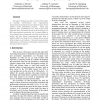Free Online Productivity Tools
i2Speak
i2Symbol
i2OCR
iTex2Img
iWeb2Print
iWeb2Shot
i2Type
iPdf2Split
iPdf2Merge
i2Bopomofo
i2Arabic
i2Style
i2Image
i2PDF
iLatex2Rtf
Sci2ools
HICSS
2005
IEEE
2005
IEEE
A Preliminary Analysis of the Influences of Licensing and Organizational Sponsorship on Success in Open Source Projects
This paper develops and tests a model of the impact of licensing restrictiveness and organizational sponsorship on the popularity and vitality of open source software (OSS) development projects. Using data gathered from Freshmeat.net and OSS project home pages the main conclusions derived from the analysis are that organizational sponsorship has a positive effect on project popularity by easing user concerns about cost and quality and that license restrictiveness may have a negative effect on popularity by reducing the perceived utility of open source software. Theoretical and practical implications are discussed, and the paper outlines several avenues for future research.
Biometrics | HICSS 2005 | Open Source Software | Organizational Sponsorship | OSS Project Home | System Sciences |
| Added | 24 Jun 2010 |
| Updated | 24 Jun 2010 |
| Type | Conference |
| Year | 2005 |
| Where | HICSS |
| Authors | Katherine J. Stewart, Anthony P. Ammeter, Likoebe M. Maruping |
Comments (0)

